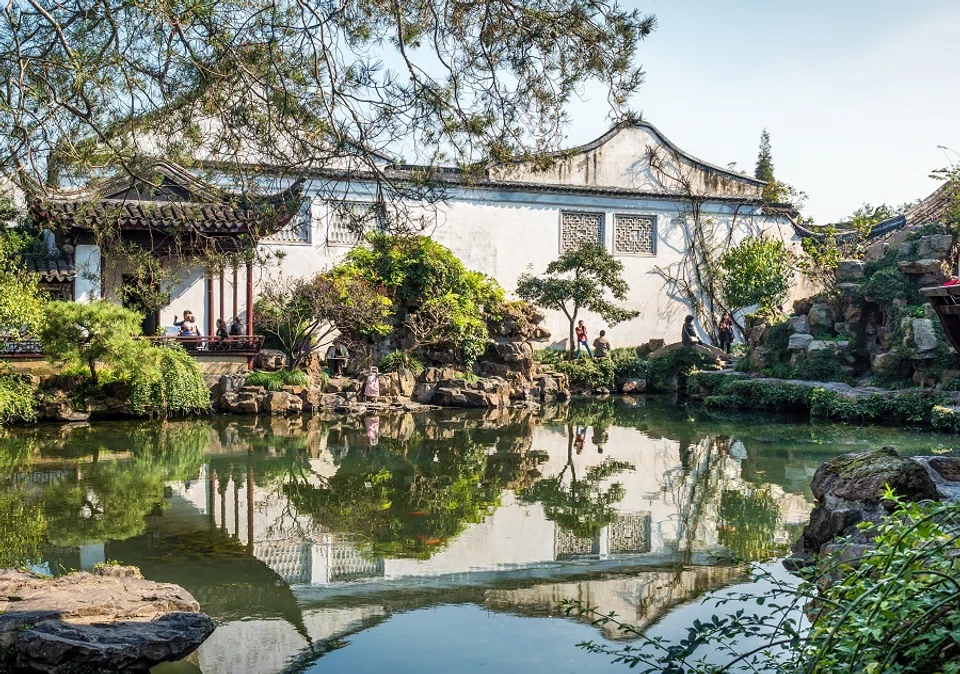When a professor falls in love with Suzhou during the Cultural Revolution
Like the gentlemen in poems of yore who were love-struck by fair maidens, Cheng Pei-kai falls in love with Suzhou at first sight. His is a cultural love story that has stood the test of time.

Fate is definitely at work when we fall in love with a person or a place. No one knows what fate is or how it can be explained. In the end, they just say it is one's destiny. Since it is all predestined, fate must be floating about in immeasurable time and space, quietly waiting for reincarnations to appear: when the lift door opens, when one hesitantly turns a corner, or even when one looks up while admiring the flowers in the garden, like Zhang Junrui did in Romance of the Western Chamber (《西厢记》) when he first saw Cui Yingying: "Ah, this must be my beloved from 500 years ago!"
What is "love at first sight"? That's another tricky question that has no clear answer. In any case, it is just as described in the first poem of the Classic of Poetry (《诗经》), Guan Ju (关雎): Seeing a pair of birds by the river, a gentleman thinks of the lady he has in his heart; she's on his mind all day and night. Day in, day out, her lovely silhouette flits across his mind, sometimes blurry, other times clear, amid a sea of people in the vast universe. Once and again, there seems to be angelic voices ringing behind him, leaving him tipsy and dazed, and he forgets who he is, where he is and what day it is.
Then only would we know if we were truly meant to meet and fall in love, and be that enduring constant in the ebbs and flows of this universe.

Falling in love may take a split second, but only time will tell if that love will last till "the seas run dry and the stones go soft", and whether the lovers are indeed "two lovebirds flying together in the sky, and twin branches of a single tree on earth". Then only would we know if we were truly meant to meet and fall in love, and be that enduring constant in the ebbs and flows of this universe.
True love runs deep
I first visited Suzhou in the early summer of 1976. The Cultural Revolution had not yet ended and society was in the middle of the "Criticise Lin (Biao), Criticise Confucius Campaign". Posters with crude wordings and savage-looking red crosses were plastered everywhere, blaring out their hatred of traitors within the party and capitalists who still walked the streets. Suzhou seemed to be enveloped in ominous clouds even on bright mornings. The streets and alleys were dark and gloomy while the sycamore trees along the roads cast dappled shadows on the ground. Set against gloomy houses and whitewashed walls, the scene looked like an old faded photograph.
The market, empty and dark, resembled a factory workshop. Seafood and poultry were nowhere to be seen, not even basic cooking necessities like oil, salt, soy sauce, and vinegar.
There were few pedestrians on the streets and when there were, they mostly looked down and had their shoulders hunched, like abandoned rag-and-bone men in deserted ancient cities, wandering about time tunnels and picking up memories left behind by time. The clothes that everyone wore only had a single colour tone - a dark greyish blue - and were all patched up. I thought that it was very strange - did they not have a piece of clothing that was neat and clean? Had they all been worn out by the passion of the revolution? Or was there some revolutionary symbolism to the patches, that not having a few patches on your clothing would mean that you have become a corrupt reactionary?

Because I wanted to know how the Suzhou people lived their daily lives, I entered a market unobserved to have a look at what they sold. The market, empty and dark, resembled a factory workshop. Seafood and poultry were nowhere to be seen, not even basic cooking necessities like oil, salt, soy sauce, and vinegar. Only two types of vegetables were sold in the entire market - cabbage and tomato - and they were already starting to rot. As they were piled up on the ground, I didn't know if they were for sale or to be redeemed with vouchers. That was in the summertime during lunch break. Perhaps everyone had gone home for an afternoon nap? But the situation was similar to how the Qin state was depicted in Records of the Grand Historian (《史记》) when it was governed by Shang Yang: "No one pockets anything found on the road, and there are no bandits in the mountains." However, supplies seemed to be inadequate for each household.
It's like an atomic bomb had just exploded into a colourful mushroom cloud before you, and the fumes were burning right into your eyes. At that moment, I knew - I had fallen in love with Suzhou.

My first impression of Suzhou was that it was dark, gloomy and dull - definitely a place that nobody would love - that is, until I stepped foot into the Master of the Nets Garden (网师园). There, I understood that the poet's seeming soliloquies were simply unvarnished sketches of extraordinary scenery. Back then, the Garden's entrance (today's back door) was north-facing. You had to walk through a narrow alley, make two turns, and enter through a grim and uninviting black door. And then, then, how shall I put it? Have you ever been in love? After that initial amazement, you hold your breath, too shocked to even utter a word. It's like an atomic bomb had just exploded into a colourful mushroom cloud before you, and the fumes were burning right into your eyes. At that moment, I knew - I had fallen in love with Suzhou.

I remember reading Ming dynasty playwright Tang Xianzu's The Peony Pavilion (《牡丹亭》) in the past. There was a scene where Du Liniang, the female protagonist, was touring a garden. Upon stepping into the garden, she said, "How can one know how stunning spring is if one doesn't step into a garden?" And then she sang, "This is such a beautiful scenery but only the dilapidated pavilion is admiring it. What should I do with such a magnificent day and beautiful landscape in front of me? Exactly who can enjoy life's pleasures?" I always felt that Tang had somewhat exaggerated the garden scene by likening it to the Penglai wonderland where the immortals live or the Garden of Eden. But as soon as I entered the Master of the Nets Garden 40 years ago, I knew that Tang was describing the wonders of love. He was setting the scene for a poignant love story.

When I visited Japan in the past, I loved Japanese gardens and thought that they were elegant and exquisitely designed. They looked like they were a three-dimensional traditional Chinese painting, but they were nevertheless just a tableau on display. In the Master of the Nets Garden, every time one passes through a rock garden or walks across a small bridge, different scenes unfold and morph in tandem with one's emotions. It is like a unique life form - a phoenix reborn from the ashes after hundreds of years. At that moment, I truly experienced the aesthetic realm of the classical Chinese world, and understood what it meant to be reincarnated and ultimately meeting your destiny no matter what. Just like the saying goes: "I have searched for her thousands of times in the chaos, and then suddenly, I turned around, and there she was, standing in the waning light."



![[Photos] Fact versus fiction: The portrayal of WWII anti-Japanese martyrs in Taiwan](https://cassette.sphdigital.com.sg/image/thinkchina/3494f8bd481870f7c65b881fd21a3fd733f573f23232376e39c532a2c7593cbc)

